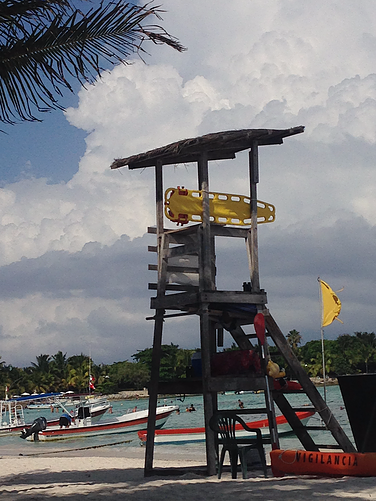 The last week of January proved how dangerous our bay can be at times and how lucky Akumal is to have a wonderful emergency team on the beach. The lifeguards and Red Cross emergency staff helped in three emergency situations in just one week. A trained staff is crucial for the bay, but more important is that we take precautions ourselves. Below are some recommendations for safe snorkeling that you can share with your renters and friends.
The last week of January proved how dangerous our bay can be at times and how lucky Akumal is to have a wonderful emergency team on the beach. The lifeguards and Red Cross emergency staff helped in three emergency situations in just one week. A trained staff is crucial for the bay, but more important is that we take precautions ourselves. Below are some recommendations for safe snorkeling that you can share with your renters and friends.
For more information on the emergencies go to http://communicationsceak.wix.com/ceaorg#!Three-potential-tragedies-averted-by-Akumal-lifeguards-and-Red-Cross-paramedics/c7cl/56a90ed20cf22a61ccd3f88d
STAY SAFE ON A SNORKEL TOUR
Make your snorkeling tour in Akumal (or beyond) an activity to remember. When choosing a snorkel tour or guide consider asking and doing the following:
• Ask about certification
Find out if the guides are first aid certified. If possible ask to see certification cards and check the expiration date. Most first aid certificates are valid for a year or two before renewal is required. Ask about other qualifications or certifications. PADI rescue divers and Dive Masters are also required to have first aid training. Some guides working in Akumal have been certified by the Tourism Secretariat through CEA. In order to get this certification guides need to verify current first aid certification and complete an in-water practical component along with written tests.
• Ask about their experience
Find out how long the guide has been working as a guide, their experience, their knowledge etc.
• Get the ratio for guides to guests
Ask what the maximum ratio of guests is per guide. Obviously the lower the ratio the better, for any type of tour. This allows for more individual attention and in the water, the guide is able to see everyone
• Try to test your gear
Make sure your lifejacket fits properly; not too big or too small.
• Try on your mask to check that it fits properly and that you feel comfortable using a snorkel. Experienced guides will make sure you are properly fitted and comfortable before going into the water. Great guides will take the time to let you test your gear in the shallow water before snorkeling out from shore.
• Know your limits and communicate them
Don’t be afraid to communicate your fears or your comfort level to your guide. Any respectable guide won’t push your limits. A suitable and appropriate pace for the whole group should be set.
• Communicate health issues or concerns directly to your guide — you cannot be sure they have read your medical release form. If you tell them you are a weak swimmer or suffer from asthma, for example, they should keep an extra eye on you.
• If it is your first time snorkeling, a brief lesson should be included. If your guide isn’t concerned about these things, it would be best to find another.
Buddy Up
Whether your guide pairs you off or not, it is best to snorkel in pairs. This way you can keep an eye out for each other and either assist if there is a problem or alert someone to help you.
-
Always stay inside the bay.
-
Always stay horizontal. Know where your fins are at all times. You don’t want to kick up the sand, or kick the reef or turtles.
-
Never stand on the reef. You can harm them and injure yourself.
-
Never touch or chase the turtles or other sea life.
-
Never dive down or swim underwater. You can damage the ecosystem and are at risk of boat traffic not seeing you.
-
Never crowd a turtle. Stay at least 3 meters away.
-
Spend no more than 2 minutes observing one turtle.
-
Wear a sunshirt or biodegradable sunscreen.
-
Know your limits! It is advisable for your safety to wear a lifejacket.
-
Be careful! You are visiting a natural area and there are hazardous animals that can harm you. Watch where you step.
-
Know the beach warning flags. Pay attention to the flags, and lifeguards, on the beach.

Leave a Reply